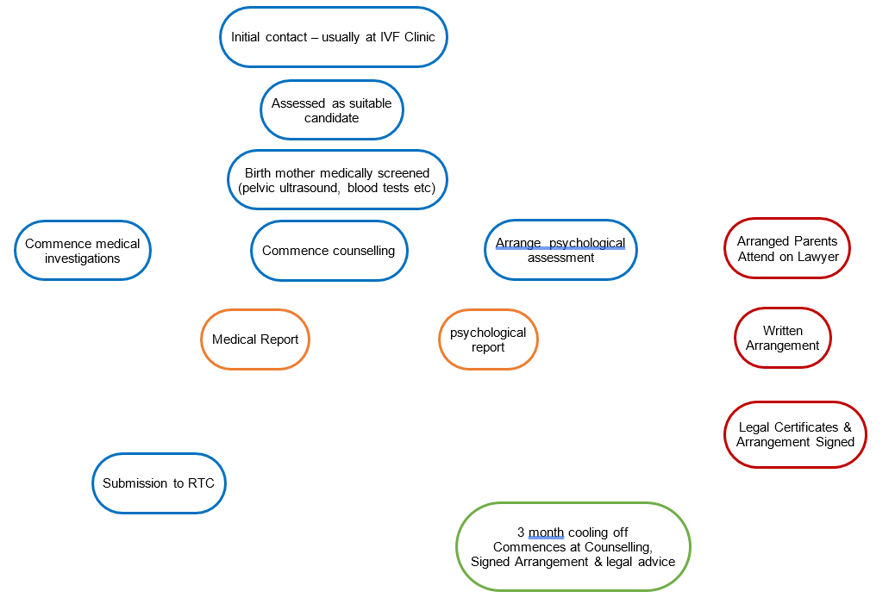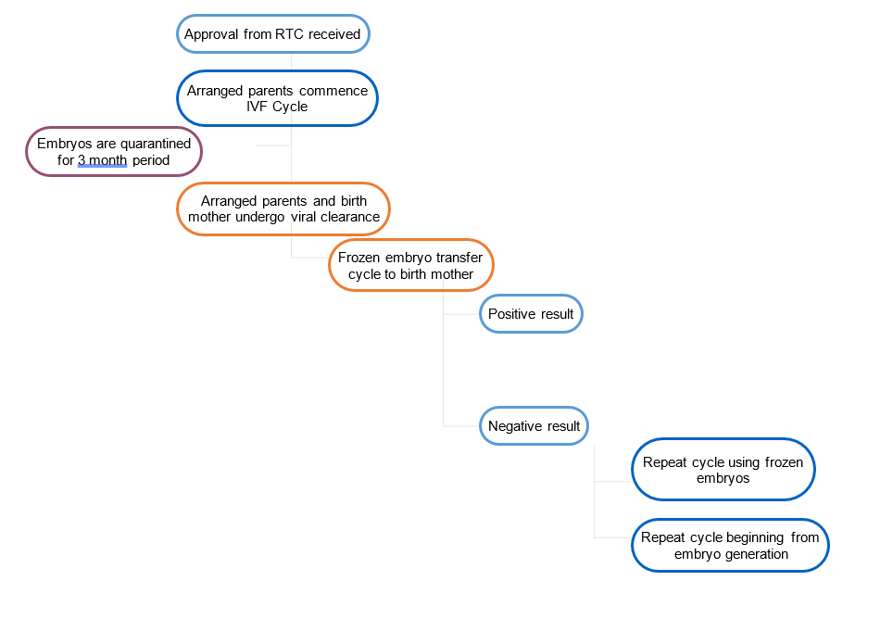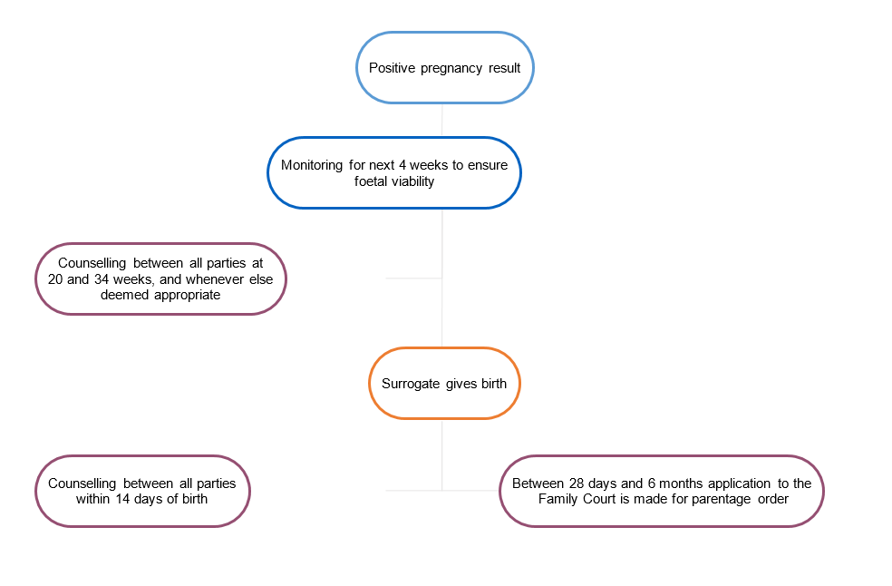Surrogacy
Fertility and surrogacy law moves far slower than medical technology and surrogacy within the Commonwealth of Australia is the subject of legislative acts and regulations which are different in each state and territory.
The next significant legislative change in Western Australia will hopefully be the amendment to the Surrogacy Act 2008 (WA) which removes the discrimination against same sex couples having access to surrogacy.
Rachel has been providing assistance and advice to parties to surrogacy arrangements under the Surrogacy Act 2008 (WA) since it was introduced in this state. She presents seminars and authors papers for state, national and international audiences.
Rachel has also advised parties to arrangements where state law in other parts of the Commonwealth applies.
Rachel is a Deputy Member of the Reproductive Technology Council of Western Australia. This is the body which (among many other things) approves surrogacy arrangements prior to treatment commencing in Western Australian clinics.
It can be incredibly difficult for intended parents to get good medical and legal advice, in part because a lot of information about the process is sourced online. Rachel recommends that intending and surrogate parents in Western Australia first approach Surrogacy Co-ordinators at clinics rather than rely on information on the internet.
There are common legislative themes throughout Australia in terms of what is required for a surrogacy arrangement to comply with the law and lead, ultimately, to legal parental status for the intending parents:
- Altruistic only – the surrogate cannot be paid other than for her expenses
- Psychological counselling required
- Legal advice must be given to all parties.
- Agreements are not enforceable, except for ‘Reasonable Expenses’
- Transfer of parentage – this final step is made by the court, which decides on the basis of best interests of the child
- The application to transfer parentage must happen within six months of birth
- Commercial arrangements (compensating or paying a surrogate more than her reasonable expenses) is a criminal offence
The Process or Steps to Surrogacy in Western Australia
The diagrams below are set out in very simple terms. This website is not a substitution for proper legal advice.
Finding a Surrogate Mother
Some intending parents are lucky in that they have a relative or close longstanding friend who volunteers to carry their baby. Others have to try and find a surrogate.
In Western Australia, it is permissible to advertise for an altruistic surrogate (in several other states that is actually prohibited by the surrogacy legislation).
Surrogacy Co-ordinators may have access to a register of women who approach.
In Western Australia there are Surrogacy Co-ordinators at the fertility clinics who provide IVF for surrogacy arrangements. They will assist intending parents and the surrogate (and her partner or spouse if she has one) to engage in implications counselling, which is required under the law of Western Australia.
Rachel recommends that parties to a surrogacy arrangement use a qualified, experienced family lawyer to draft up a written surrogacy agreement (beware the internet templates!). Surrogates and intending parents must have separate lawyers who give advice about the surrogacy arrangement and those lawyers must provide a certificate confirming that they have given it and are qualified to give it.
Executing the Surrogacy Arrangement
Legal Certificates should be completed prior to parties signing the agreement.
Once complete, the signed agreement (and initialled annexures) is provided to the Surrogacy Co-ordinator of the parties’ chosen clinic. The Surrogacy Co-ordinator will then complete the paperwork necessary to submit the arrangement to the RTC[1]. The original signed surrogacy arrangement is usually provided to the arranged parents, who will deliver the arrangement to their Surrogacy Co-ordinator.
It is advisable to retain a file copy of the arrangement and the legal advice, to be retained permanently, in much the same way that a Last Will and Testament would be retained in the legal file.
The Surrogacy Act 2008 (WA) provides for a three month cooling off period[2] between completion of implications counselling, psychological assessment and legal advice; before approval can be granted for a clinic to commence IVF for a surrogacy arrangement. In practice, clinics will often submit an arrangement to the RTC prior to completion of the cooling off period, with a request that approval be granted, subject to completion of the three month cooling off period[3].
The RTC meets monthly. Deadlines for submitting forms are published on their website[4]. The Surrogacy Co-ordinator in usually informed in writing within seven days of a council meeting if an arrangement is approved by the council.
RTC Approves the Arrangement – Now What?
For a gestational surrogacy arrangement, the fertility clinic needs to commence hormone treatment for the egg donor (usually the arranged mother’s egg is used but sometimes it is a third-party egg donor) so that oocytes can be harvested. At the time of extraction of the donor egg, the arranged father or sperm donor will provide a sample. Embryos are then created in the clinic laboratory.
Although not specifically mandated in the Surrogacy Act 2008 (WA), clinics usually recommend a three-month quarantine period before embryo transfer to the surrogate.
Some clinics will permit parties to waive the quarantine period but they advise against it.
Before an embryo is transplanted into the surrogate’s uterus, the surrogate also needs to undergo hormone treatments to prepare the lining of the uterus for transfer.
Within about a week of transfer, a blood test is taken to determine whether the transfer has resulted in a pregnancy.
After a negative result, the surrogate will have to re-start the hormone cycle and IVF treatment again. It is common for a surrogacy arrangement to specify the number of cycles that a surrogate is willing to undergo in an attempt to achieve a pregnancy.
If a pregnancy is achieved after the first cycle, there are likely to be embryos in cryogenic storage. Again, it is common for a surrogacy arrangement to detail what is intended for excess embryos. This is especially important where a third-party donor egg is used.
Inter-State Surrogacy Options
Surrogacy arrangements are available in every other state and territory in the Commonwealth[5].
To avoid ‘forum shopping’[6] most state and territory legislation includes a residency requirement for approval of a surrogacy arrangement or application for transfer of parentage. Generally, the arranged or intended parents must be resident in the state where the application for transfer of parentage will be lodged.
It is common for Western Australian lawyers to be approached by Western Australian altruistic surrogates who are willing to enter into an arrangement where the arranged or intended parents are resident in another state.
Example 1:
- Intended parents (heterosexual couple) in New South Wales wish to enter into an arrangement with a family member who resides in Western Australia and wishes to give birth in Western Australia.
- An arrangement will be drafted by a New South Wales lawyer, under the terms of the Surrogacy Act 2010 (NSW).
- IVF treatment, including embryo transfer will take place in New South Wales.
- If the surrogate gives birth in Western Australia, the birth certificate will be obtained from the Western Australian Registry of Births Deaths and Marriages.
- At the time the New South Wales arranged parents apply for a Transfer of Parentage order under the New South Wales legislation, they will apply for an order which directs the Registrar of the Births Deaths and Marriages Act in Western Australia to amend the Western Australian birth certificate pursuant to section 26 of the Births Deaths and Marriages Act 1998 (WA):
26. Order in other State: birth registered in WA
(1) If —
(a) an adoption order or parentage order is made or discharged under a law in force in another State; and
(b) the order was made or discharged in relation to a person whose birth is registered under this Act,
the particulars (if any) provided under that law must be registered by the Registrar in relation to the registration of the person’s birth.
(2) In subsection (1) —
parentage order means an order substantially similar in effect to a parentage order under the Surrogacy Act 2008. [emphasis added]
Example 2:
- Intended parents (male gay couple) in Victoria wish to enter into an arrangement with a family member who resides in Western Australia and wishes to give birth in Western Australia.
- An arrangement will be drafted (or negotiated – Victorian Surrogacy arrangements don’t have to be written, although Rachel recommends it) by a Victorian lawyer, under the terms of the Status of Children Act 1974 (VIC).
- The arrangement, along with conformation of legal advice, will be submitted for approval by the Patient Review Panel in Victoria.
- If approval is granted, IVF treatment, including embryo transfer will take place in Victoria.
- If the surrogate gives birth in Western Australia, the birth certificate will be obtained from the Western Australian Registry of Births Deaths and Marriages.
- At the time the Victorian arranged parents apply for a Transfer of Parentage order under the Victorian legislation, they will apply for an order which directs the Registrar of the Births Deaths and Marriages Act in Western Australia to amend the Western Australian birth certificate pursuant to section 26 of the Births Deaths and Marriages Act 1998 (WA) (see above).
International Surrogacy Arrangements: Traps to Avoid
International surrogacy arrangements are usually commercial arrangements. Under no circumstances should a Western Australian lawyer facilitate a commercial arrangement. It is a criminal offence under section 11 of the Surrogacy Act 2008 (WA):
11. Services connected with surrogacy arrangement that is for reward
- A person who provides a service knowing that the service is to facilitate a surrogacy arrangement that is for reward commits a crime except in the circumstances described in subsection (2).
- It is not an offence against subsection (1) if the service is a health service provided to the birth mother after she has become pregnant.
Penalty: imprisonment for 5 years.
Summary conviction penalty: a fine of $12 000 or imprisonment for one year.
The availability of surrogacy in overseas jurisdictions is rapidly changing. For Australian ‘fertility tourists’, India and Thailand used to be the ‘go to’ destinations for affordable surrogacy. When India introduced a medical tourism visa, available only to married couples, the unregulated industry in Thailand exploded.
Then came the ‘Baby Gamy’ case[7]. A series of measures in neighbouring international destinations were introduced quickly, ostensibly intended to prevent exploitation of surrogates in third world countries:
- In July 2015 The Thai government effected a ban on commercial surrogacy.
- In September 2015, the Nepalese Government issued a ban on all surrogacy services.
- In November 2015, the Government of India issued advice confirming surrogacy was no longer accessible to foreigners.
- In January 2016, the Congress of the Mexican state of Tobasco enacted a ban on surrogacy for foreigners.
- In January 2016, China reversed its ban on surrogacy through legislative amendment.
- In April 2016, Chief Judge Thackray gave the Gamy Judgement.
- In November 2016, the Ministries of Health and Justice banned surrogacy. An Australian nurse, charged with running an illegal surrogacy clinic.
Cross-border surrogacy remains available in some states of the USA and a handful of countries including Canada, the Ukraine, Russia Laos and Guatemala.
There have been some occasions where Australian Courts have been persuaded to make orders which give legal parental status to intending parents who have engaged in commercial surrogacy arrangements overseas but those cases are exceptional and it should not be assumed that there is any precedent in the Family Court of WA which will lead to certainty of parental status for children born to overseas surrogacy arrangements. Rachel recommends that parties seek legal advice before making any application; especially as admission of a criminal offence may be involved.
Noting that Western Australian Lawyers should avoid facilitating commercial surrogacy arrangements, there are very few WA lawyers who will advise clients before they embark upon an international arrangement, other than to advise against it. Even when advising against international commercial arrangements, it is essential to be across the ever-changing developments in ‘popular’ overseas jurisdictions.
Several international clinics employ agents within the Commonwealth of Australia who will falsely advise commissioning parents about the legality of their arrangements and their legal status of parents[8].
___________________________________________________________
[1] The forms to be completed by clinics are available to view on the Reproductive Technology website at http://www.rtc.org.au/information-for-clinics/
[2] See s17(c) of the Surrogacy Act 2008 (WA)
[3] The advantage of submitting an arrangement prior to the end of the three-month cooling off period is that it provides the RTC with an opportunity to identify any further information they may require to be able to approve an arrangement
[4] http://www.rtc.org.au/about-us/
[5] The Northern Territory is the only commonwealth jurisdiction which does not have legislation governing Surrogacy Arrangements. Arguably there is no prohibition on surrogacy in that territory. However, the clinics in the Northern Territory are associated with South Australian clinics and generally operate under the NHRMC guidelines and South Australian Legislation
[6] The Standing Committee of Attorneys-General, Australian Health Ministers’ Conference, Community and Disability Services Ministers’ Conference Joint Working Group confidently assumed that the inclusion of residency requirements would ‘prevent exploitation’ of forum shopping in Australia: A Proposal for a National Model to Harmonise Regulation of Surrogacy, January 2009, p 14
[7] See Farnell v Chanbua [2016] FCWA 17
[8] See “Surrogacy For Australians” by Michael Nicholls QC and Rachel Oakeley, International Family Law Journal (March [2015] IFL 12) for detailed discussion as to legal parental status in international surrogacy arrangements



